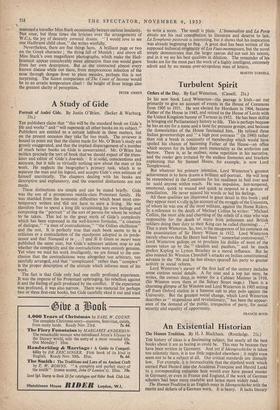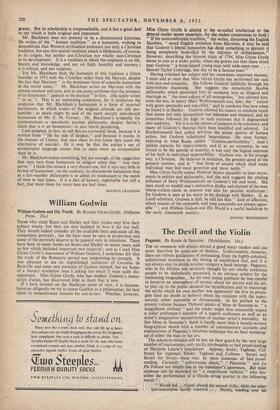An Existential Historian
The Human Tradition. By H. J. Blackham. (Routledge. 21s.) THE history of ideas is a fascinating subject, but nearly all the best books about it are as boring as could be. This may be because they have been written in Germany. And yet if Ideengeschichte is taken too solemnly there, it is too little regarded elsewhere ; it might even seem not to be a subject at all. Our critical standards 'are dismally low. For example, it is inconceivable that the slipshod work which carried Paul Hazard into the Academie Frangaise and Harold Laski to a corresponding eminence here would ever have passed muster in Germany, or even in France and England, if the work of German scholars "had been more readable and hence more widely read.
The Human Tradition is an English essay in Ideengeschichte with the merits and defects of a German work. It is heavy. It lacks literary
graces, But its scholarship is irreproachable, and it, has a great deal to say which is both original and important. Mr. Blackham does not pretend to be a disinterested historian. He writes of the " human tradition " as a humanist, wishing to demonstrate that Western civilisation embraces not only a Christian tradition, but also this second tradition which is Hellenistic, of course, in its origins, but neither anti-Christian nor wholly non-Christian in its development. It is a tradition in which the emphasis is on life, beauty and knowledge, and not on faith, humility and mystery ; it is ethical, and not religious.
Yet Mr. Blackham finds the humanist of this tradition a fellow traveller in 1953 with the Christian rather than the Marxist, despite the fact that Marxism " is the dominant form of scientific humanism in the world today." Mr. Blackham writes on Marxism with the utmost candour and care, and at one point confesses that the prospect of its fanaticism" appeals to the puritan " in him. (He rashly writes " in us.") This is an interesting confession, for it reinforces the suspicion that Mr. Blackham's humanism is a form of inverted puritanism, in which traces of the original attitude are still per- ceptible ; as much might be said of the more sharply anti-clerical humanism of Mr. E. M. Forster. Mr. Blackham's sympathy for existentialism—a manifestly puritan philosophy despite Sartre's claim that it is un humanisme—is also worth pondering.
• I am tempted, in fact, to call this an existential book, because it is written from " the far side of despair," and because it insists, in the manner of Camus, that men chose to live (since they reject the alternative of suicide). Or it may be that the author's use of existentialist language causes him to seem more an existentialist than he is.
Mr. Blackham makes something, but not enough, of the suggestion that men turn from humanism to religion when they " lose their nerve." I think this remark a very shrewd one, but it says very little in favour of humanism ; on the contrary, to characterise humanism thus at a fair-weather philosophy is to admit its inadequacy to the needs of men in bad times. It is a fact of history, regrettable but still a fact, that most times for most men are bad times.
MAURICE CRANSTON



































 Previous page
Previous page